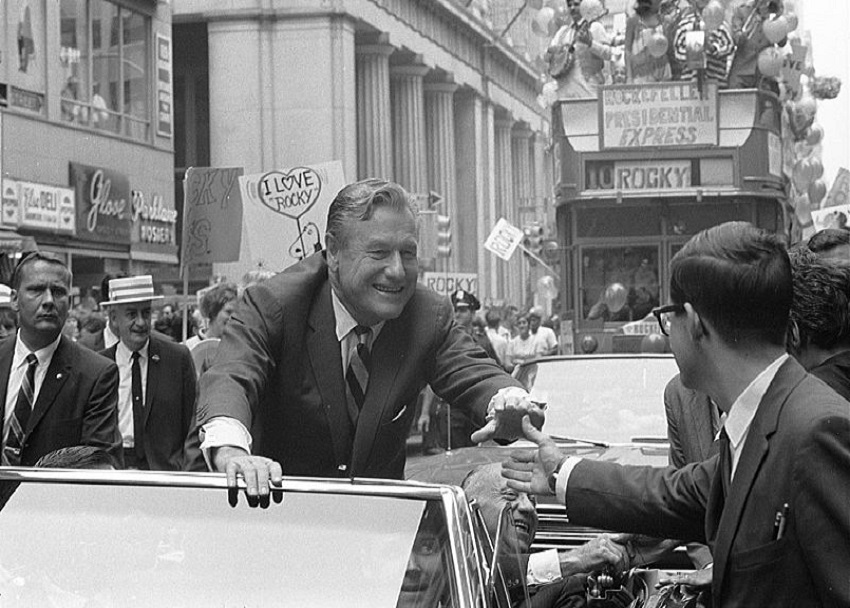“I do not believe it right for one group to impose its vision of morality on an entire society.”
- Nelson A. Rockefeller
Paid a Visit
Several weeks ago, TFP (Tradition, Family, Property) Student Action came to George Washington University.
This group has come to GWU before, usually to protest for socially conservative causes, with their current cause of choice being abortion. As many probably expected, a large group of students assembled in counter-protest immediately.
I watched this spectacle unfold. The second I heard the group’s signature bagpipes playing I went to the scene to watch them interact with students, and observed many students argue with the TFP protestors.
There were many pro-choice arguments I heard from students. However, there is one which is strongest – which has a history behind it, and which is hardest to argue against.
Another Age
April 11th, 1970.
The most liberal abortion law in American history is passed in New York – and signed by Republican Governor Nelson Rockefeller.
While several other states had already taken steps to loosen abortion restrictions, the defining features of the New York law were that it eliminated nearly all restrictions – including a residency requirement. The only requirements were that an abortion could only be performed before 24 weeks of pregnancy, and that the procedure must be carried out by a licensed, accredited medical professional.
Almost immediately after the bill’s passage and running through early 1973, conservative legislators repeatedly tried to repeal the statute, but Rockefeller vetoed all attempts.
New York became an abortion haven during this period, with the majority of abortion patients being from outside the state.
It is true that Rockefeller was of a dying breed of liberal, northeastern Republicans. However, there were other members of his party at the time of a more conservative bent, but who were nonetheless pro-choice. In 1967, none other than Ronald Reagan supported an abortion rights bill.
As Governor of California, Reagan signed the Therapeutic Abortion Act, which legalized the procedure for reasons of health, rape, or incest.
Today, we accurately view the Democrats as the pro-choice party and the Republicans as the opposite, but in Rockefeller’s era, the situation was much more mixed. If anything, the GOP was more pro-choice.
A 1972 poll found support for abortion rights among Republican voters at 68% (!). It is possible, if not likely, that the Democrats were more anti-choice at this time. This was mainly due to the working-class Catholics which were a large Democratic constituency, and opposed the procedure for religious reasons.
The reasoning that these Republican voters gave was simple: abortion was private, between a woman and her doctor, period. It was a civil rights issue – the government had no right to be involved.
Winning the Argument
After TFP Student Action left my campus, I did some more research. I found that they actually had a YouTube channel, where they publish videos of their interactions with counter-protestors. As students made their pro-choice arguments, several made the one outlined above, but not enough. Most got into the weeds regarding fetal viability, what time periods abortions were performed in, and religious arguments (TFP is a Catholic organization).
But I don’t think that is the best way to go about the abortion debate, for it ignores the fundamental aspect of the pro-choice position.
Pro-choice. Not pro-abortion. Big difference.
Being pro-choice does not mean that you actually want abortions to happen. It simply means that you don’t believe the government has the right to prevent women from obtaining one. It means that you feel that birth confers personhood, and until that point, the government must stay out.
The beauty of this argument is that it provides a big tent. Hypothetically, a woman can believe fully that life begins at conception, and never choose to get an abortion herself, but still be pro-choice. Why? Because she believes that she shouldn’t impose her view on when life begins on the entire society. Her business is simply her own medical decisions, not that of others.
A Middle Ground?
We see the battle over abortion rights playing out across our country at this moment, particularly at the state level. Some may believe it is possible for there to be a middle ground on abortion.
Sure, we can see an established law in a state which allows abortion up to a certain point, and then restricts it thereafter – variations of such laws exist in most states.
However, I’m of the opinion that, culturally, there can never be a middle ground on this issue.
In one of the TFP videos I saw, a protestor was asked whether he believed abortion should be banned even in the case of rape. He responded, unflinchingly, that he did.
I was horrified by this position.
But from the protestors’ perspective, it is clear. There are some who believe so strongly that life begins at conception, and that all abortion is, simply put, murder. Who feel that a woman obtaining the procedure is fundamentally ending a human life, equivalent to shooting someone in the face.
To them, every abortion stopped is a victory, and any measure which restricts access even further is necessary.
Because of this, I’m skeptical that there can be a cultural middle-ground. I don’t see “everyone coming together.” I think that people will vote, one side will win, the other will lose, and the law will change accordingly.
An endless push-and-pull.
But that doesn’t mean it is a waste of time to argue about this issue. Even if you don’t change minds, it can still be healthy to express your views, and learn how to better rally support for your cause.
As a final point, I have some good news for the members of TFP Student Action:
If they disapprove of abortion, they don't have to get one.
